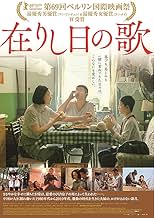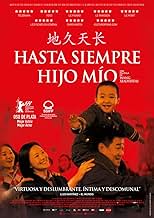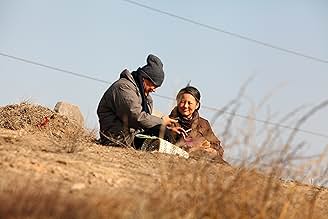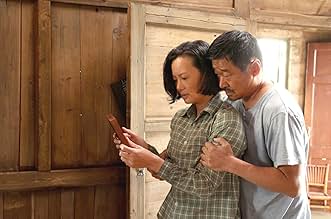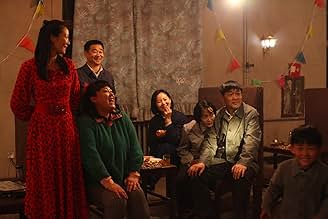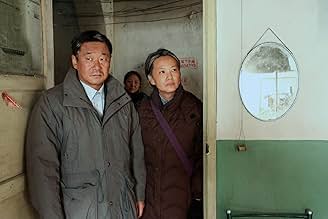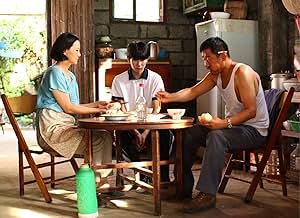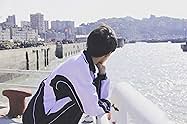Di jiu tian chang
- 2019
- 3h 5min
VALUTAZIONE IMDb
7,7/10
5859
LA TUA VALUTAZIONE
Due coppie sposate si adattano ai vasti cambiamenti sociali ed economici in atto in Cina dagli anni '80 ad oggi.Due coppie sposate si adattano ai vasti cambiamenti sociali ed economici in atto in Cina dagli anni '80 ad oggi.Due coppie sposate si adattano ai vasti cambiamenti sociali ed economici in atto in Cina dagli anni '80 ad oggi.
- Regia
- Sceneggiatura
- Star
- Premi
- 43 vittorie e 60 candidature totali
Yanguozhang Zhao
- Xinjian Zhang
- (as Yangouzhang Zhao)
Recensioni in evidenza
Saw this at the Berlinale 2019, where it was part of the official Competition. Two prizes were awarded: Silver Bear for Best Actor (Wang Jingchun) and one Silver Bear for Best Actress (Yong Mei). Apart from the acting, it was very interesting to see China transform in thirty years time, albeit that we see only a rural part of China, far away from the big city centers, thus avoiding large scale business and touristic areas.
Showing China while undergoing a drastic change, is one of the main themes of this movie, if not the main one. From a side line we get to see the transformation in progress, going from a communist country towards modern (semi?) capitalism. Factories, workplaces and houses the people work and live in, seem carefully designed to be true to the reality of the times at hand, thereby demonstrating an admirable attention for details.
A perfect example was the factory closure. The gathering with the workers was very illustrative. It showed that such things went in communist times exactly as how it goes nowadays. The workers assembled can protest and find that the director must be sent away. The harsh reality was (of course) in communist times exactly as in our capitalist times. Jobloss overcomes the humble workers, as if it was a natural disaster. There is nothing they can do about it, regardless of all being called "comrades". Neither can help be found in communist textbooks and the principles of "worker's self management".
On the other hand, regarding the implicit second theme, the family related stories of the protagonists, the developments were difficult to follow for me. This was partly due to some unnecessary time jumps and flash backs, partly caused by not telling who-is-who when a new protagonist appears, partly because of me being unable to tell Chinese people apart. Though the story starts with a fatal drowning accident, the people involved will re-unite in the end and will live happily ever after, even when the real truth comes out thirty years later, and even after someone admits having played a dark role in the accident.
It is no problem to sit out the three hours this movie lasts, though not really involving on a human level. And it was certainly not moving or heart-breaking as per what other reviewers wrote. The ground cause for this psychological distance is (see above) the difficulties I had to follow the persons involved, besides the fact that their logic was failing on me a few times.
All in all, I was glad to have seen this movie, regardless of my problems with following the various personal story lines and their interwoven connections. The nearly three hours are easy to sit through, so no problem there. And the ending was a surprise (no details, no spoilers), particularly because it did not cause a hard break in relationships, despite there would have been ample reason for a break-up after admitting a few 30-year-old lies.
Showing China while undergoing a drastic change, is one of the main themes of this movie, if not the main one. From a side line we get to see the transformation in progress, going from a communist country towards modern (semi?) capitalism. Factories, workplaces and houses the people work and live in, seem carefully designed to be true to the reality of the times at hand, thereby demonstrating an admirable attention for details.
A perfect example was the factory closure. The gathering with the workers was very illustrative. It showed that such things went in communist times exactly as how it goes nowadays. The workers assembled can protest and find that the director must be sent away. The harsh reality was (of course) in communist times exactly as in our capitalist times. Jobloss overcomes the humble workers, as if it was a natural disaster. There is nothing they can do about it, regardless of all being called "comrades". Neither can help be found in communist textbooks and the principles of "worker's self management".
On the other hand, regarding the implicit second theme, the family related stories of the protagonists, the developments were difficult to follow for me. This was partly due to some unnecessary time jumps and flash backs, partly caused by not telling who-is-who when a new protagonist appears, partly because of me being unable to tell Chinese people apart. Though the story starts with a fatal drowning accident, the people involved will re-unite in the end and will live happily ever after, even when the real truth comes out thirty years later, and even after someone admits having played a dark role in the accident.
It is no problem to sit out the three hours this movie lasts, though not really involving on a human level. And it was certainly not moving or heart-breaking as per what other reviewers wrote. The ground cause for this psychological distance is (see above) the difficulties I had to follow the persons involved, besides the fact that their logic was failing on me a few times.
All in all, I was glad to have seen this movie, regardless of my problems with following the various personal story lines and their interwoven connections. The nearly three hours are easy to sit through, so no problem there. And the ending was a surprise (no details, no spoilers), particularly because it did not cause a hard break in relationships, despite there would have been ample reason for a break-up after admitting a few 30-year-old lies.
This years we are witnissing something of a "Chinese new wave". "So long my son" was already the third Chinese film I saw this year (after "An elephant sitting still" (2018, Bo Hu) and "Long day's journey into night" (2018, Gan Bi)).
"So long my son" is the perfect sequel to "Lifetimes" (1994, Zhang Yimou). "Lifetimes" covers de period 1940 - 1970 in Chinese history and "So long my son" the period 1980 up till now. In "Lifetimes" the culrurel revolution is the most defining event, in "So long my son" it is the one child policy.
In "Lifetimes" the story is told in chronological order. "So long my son" jumps back and forth in time. Together with the many characters "So long my son" asks from his viewers that they keep paying attention. The one who does so is richly rewarded for this. Moreover the peculiar chronological order is in my opinion less artificial than in for example "Memento" (2000, Christoher Nolan). Some events in the film have such an emotional "gravity" that it is just natural that they disrupt the normal chronological order.
"So long my son" is in some ways critical to Chinese society. Apart from the one child policy and the damage it has done it shows the growing gap between rich and poor. The critisism mainly concerns however policies started by Deng Xiaoping. The widening of the distance between rich and poor is after all an indirect consequence of the open door policy (mixed state ruled and market economy) that was introduced in 1978.
"So long my son" says nothing about the surveillance state that Xi Jinping is building at the moment. Long it was thought that a more market oriented economy would lead by itself to a more liberal political system. This did not happen, and one can call that "The Chinese paradox". Now we have a smaller "Chinese paradox" in the movie industry, where the surveillance state does not preclude the already mentioned Chinese new wave.
"So long my son" is the perfect sequel to "Lifetimes" (1994, Zhang Yimou). "Lifetimes" covers de period 1940 - 1970 in Chinese history and "So long my son" the period 1980 up till now. In "Lifetimes" the culrurel revolution is the most defining event, in "So long my son" it is the one child policy.
In "Lifetimes" the story is told in chronological order. "So long my son" jumps back and forth in time. Together with the many characters "So long my son" asks from his viewers that they keep paying attention. The one who does so is richly rewarded for this. Moreover the peculiar chronological order is in my opinion less artificial than in for example "Memento" (2000, Christoher Nolan). Some events in the film have such an emotional "gravity" that it is just natural that they disrupt the normal chronological order.
"So long my son" is in some ways critical to Chinese society. Apart from the one child policy and the damage it has done it shows the growing gap between rich and poor. The critisism mainly concerns however policies started by Deng Xiaoping. The widening of the distance between rich and poor is after all an indirect consequence of the open door policy (mixed state ruled and market economy) that was introduced in 1978.
"So long my son" says nothing about the surveillance state that Xi Jinping is building at the moment. Long it was thought that a more market oriented economy would lead by itself to a more liberal political system. This did not happen, and one can call that "The Chinese paradox". Now we have a smaller "Chinese paradox" in the movie industry, where the surveillance state does not preclude the already mentioned Chinese new wave.
An immense emotional masterpiece with intellectual vibrations which invites the audience, through the crossed gaze of several Chinese families, to question the universality of the feeling of filiation and the meaning of existence. A magisterial and bitter melodrama. 7/8 of 10.
I saw it as a honest - precise portrait of contemporary China. And as realistic, warm image of the essence of parenthood. A profound iuseful film for so many motives than it is unfair to define one of them because, I suppose, each viewer discovers something precious in this film about relations, children, names, fury and love at intense levels and, more important, about truth to yourself.
In very many ways this film is almost a reboot of Zhang Yimou's film To Live, from 1994, which tells the many trials and tribulations of a family from the founding of the People's Republic in 1949 to the end of the Cultural Revolution in 1976. So Long My Son picks up that chronological baton, and tells a story about family bonds, the meaning of friendship and what constitutes our morals and ethics through the last 30/40 years of Chinese history, from a stilted, materially basic time of 1980 through to the hypermodernity of China in the 2010s.
In the same way To Live aimed thinly disguised critiques at the Chinese government's policies through showing its impact on ordinary people, So Long My Son fires a number of shots too and it's in fact a little surprising to me some of these have been overlooked by the censors. The most obvious of them is the criticism of the one child policy, but hidden in there too are mentions of the privatisation of state owned industries in the early 90s and the mass redundancies that went with them, as well as criticism of the wealth inequality of modern China that has ensued from the market economy transition of the 80s and 90s.
I'm unsure if this was a problem specific to the release version I saw, though I have seen other reviews saying the plot was hard to follow, but I noticed that the English subtitles was often only translating about 1/5 of the dialogue in Mandarin. As a speaker of both, I followed the plot and characters quite easily, but can absolutely understand why many reviewers and comments have said they found the characters and plots hard to distinguish if the subtitling was a problem. However, with one eye on the subtitles, I think the fact they were missing a lot of the Mandarin dialogue would have created a really dreamy plotline that complements well the cinematographic style deployed - long panoramic shots that suddenly cut into a character's perspective; languid sequences that soak in the environment; and shots designed to make the audience feel voyeurs in a private situation.
In the same way To Live aimed thinly disguised critiques at the Chinese government's policies through showing its impact on ordinary people, So Long My Son fires a number of shots too and it's in fact a little surprising to me some of these have been overlooked by the censors. The most obvious of them is the criticism of the one child policy, but hidden in there too are mentions of the privatisation of state owned industries in the early 90s and the mass redundancies that went with them, as well as criticism of the wealth inequality of modern China that has ensued from the market economy transition of the 80s and 90s.
I'm unsure if this was a problem specific to the release version I saw, though I have seen other reviews saying the plot was hard to follow, but I noticed that the English subtitles was often only translating about 1/5 of the dialogue in Mandarin. As a speaker of both, I followed the plot and characters quite easily, but can absolutely understand why many reviewers and comments have said they found the characters and plots hard to distinguish if the subtitling was a problem. However, with one eye on the subtitles, I think the fact they were missing a lot of the Mandarin dialogue would have created a really dreamy plotline that complements well the cinematographic style deployed - long panoramic shots that suddenly cut into a character's perspective; languid sequences that soak in the environment; and shots designed to make the audience feel voyeurs in a private situation.
Lo sapevi?
- QuizThe film explores the consequences across three decades of China's onetime one-child policy which lasted from 1979-2013.
- BlooperWhen Hao Shen's mother died, he wore a black cloth on his left arm. However, in most areas of China, especially in northern China, it is a folk custom for children to wear a black cloth on their right arm after the death of mother.
- ConnessioniReferenced in Estrenos Críticos: Septiembre 2019 (2019)
- Colonne sonoreAuld Lang Syne
Traditional tune, lyrics by Robert Burns
I più visti
Accedi per valutare e creare un elenco di titoli salvati per ottenere consigli personalizzati
- How long is So Long, My Son?Powered by Alexa
Dettagli
- Data di uscita
- Paese di origine
- Siti ufficiali
- Lingue
- Celebre anche come
- So Long, My Son
- Luoghi delle riprese
- Aziende produttrici
- Vedi altri crediti dell’azienda su IMDbPro
Botteghino
- Lordo in tutto il mondo
- 8.096.596 USD
- Tempo di esecuzione3 ore 5 minuti
- Colore
- Proporzioni
- 1.78 : 1
Contribuisci a questa pagina
Suggerisci una modifica o aggiungi i contenuti mancanti

Divario superiore
By what name was Di jiu tian chang (2019) officially released in India in English?
Rispondi
![Guarda Trailer [OVS]](https://m.media-amazon.com/images/M/MV5BZThlNmFjNjAtNjkwZS00NTU1LWJkM2ItZGIyNmVlZDRmMGM5XkEyXkFqcGdeQXRyYW5zY29kZS13b3JrZmxvdw@@._V1_QL75_UX500_CR0)
